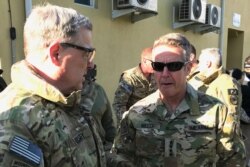The top U.S. military commander met this week with leaders of the Afghan Taliban insurgency and Afghanistan's government to urge a reduction in violence across the war-torn South Asian country.
Gen. Mark Milley, chairman of the Joint Chiefs of Staff, visited Qatar on Tuesday for talks with Taliban leaders based in Doha, the capital, of the gulf nation. He flew to Kabul on Wednesday and met with Afghan President Ashraf Ghani.
“The most important part of the discussions I had with both the Taliban and the government of Afghanistan was the need for a reduction in violence,” Milley told reporters traveling with him. “Everything else hinges on that.”
The general declined to discuss details of either talks.
Milley’s interaction with insurgent leaders reportedly lasted more than two hours. This was the second time he has met with the Taliban. His first encounter with the group in June was kept from media, and it was the first time a chairman of the U.S. Joint Chiefs of Staff had met the Taliban.
The Taliban, which maintains its political office in Doha, has not immediately commented on the meeting.
A Pentagon announcement Thursday said the talks between Milley and Ghani focused on the current security environment in Afghanistan. But it did not mention anything about Tuesday’s meeting with the Taliban in Doha.
“The United States remains fully committed to helping Afghans create a secure and stable Afghanistan by supporting inclusive efforts to achieve peace,” the readout concluded.
A presidential statement in Kabul said Milley reaffirmed the U.S. support for the country’s national defense and security forces. He also expressed concerns over the rise in violence in Afghanistan and emphasized the need for a “significant” reduction in it, according to the statement.
The top U.S. general’s visits to Doha and Kabul come as the Trump administration is reducing the number of U.S. forces in Afghanistan from about 4,500 to 2,500 by mid-next month, in line with a troop withdrawal deal Washington signed with the Taliban in February.
However, Afghan violence has continued to flare, posing a serious challenge to nascent peace talks between the Taliban and representatives of Kabul.
The so-called intra-Afghan negotiations, a crucial outcome of the February 29 U.S.-Taliban deal, started in September in Doha, and have since made some progress. The two negotiating teams have taken a break from Dec 14 to Jan 5 for internal deliberations.
U.S. leaders have been pressing the Afghan rivals to move quickly toward a political power-sharing settlement and a comprehensive nationwide ceasefire.
The Taliban has halted attacks on U.S. and coalition forces since signing the February deal, but it has continued to stage deadly attacks against Afghan government forces, prompting strong retaliation from in the form of Afghan ground and airstrikes.
The fighting has killed hundreds of combatants on both sides and civilians, with both Taliban and Afghan officials blaming each other for the escalation.
The U.S.-Taliban deal requires all foreign troops to withdraw from Afghanistan by May 2021. In return, the insurgents pledged to break ties with al-Qaida and prevent transnational terrorist groups from using Afghan soil to launch international attacks.
The Taliban also has pledged to find a negotiated settlement to the country’s long conflict through the ongoing intra-Afghan dialogue. The insurgents, however, have turned down calls for a ceasefire, saying it is one of the issues on the agenda of the intra-Afghan negotiations.
VOA national security correspondent Jeff Seldin contributed to this report.





